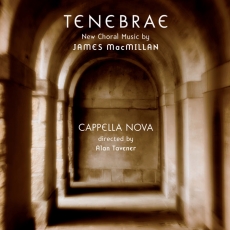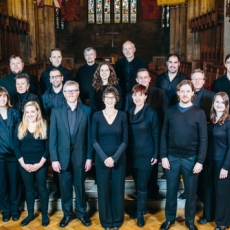MacMillan: Tenebrae - Cappella Nova - American Choral Journal
By now I'm sure that most Choral Journal readers are familiar with the music of James MacMillan. The Scottish composer burst onto the international scene in the 1990's with works such as The Confession of Isabel Gowdie, The Seven Last Words from the Cross, and The Tryst. Since that time, MacMillan has built a catalogue of more than 70 published works and nearly 50 recordings, firmly securing his place as one of the most prolific and sought-after composers working today.
The new release Tenebrae, by the Scottish chamber choir Cappella Nova conducted by Alan Tavener, is a superb addition to the catalogue of MacMillan recordings. The works presented on the recording - seven of the ten Strathclyde Motets, the introit "Give me Justice", the Missa Brevis and the three Tenebrae Responsories - represent some of MacMillan's most recent contributors. And yet the Missa Brevis has a retrospective aspect as well. MacMillan originally composed the work when he was just seventeen, which marks it as one of his earliest choral works, predating even his first published choral composition, his Beatus Vir, by some seven years. The result is a disc that inhabits, and finds artistic clarity in the juxtaposition of two seemingly diametrically opposed elements. In this case, both the currency of the works and the early genesis of the Missa Brevis bring listeners full circle, allowing them to experience the composer's past and its impact on the present.
The Strathclyde Motets grew out of MacMillan's collaboration with the Strathclyde University Choir, an ensemble also conducted by Alan Tavener. MacMillan began composing these works in 2004 for use by the Chamber Choir at University Mass. Each is a setting of a communion text from the Mass propers liturgically intended for use on various Sundays and Feast Days throughout the year. It is here, perhaps more than anywhere else on the recording, that we hear most clearly MacMillan's interest in historical Catholic musical archetypes, which imbue these pieces with a sense of timeless mysticism. The motet In splendoribus sanctorum, which features a haunting semi-improvised part for obbligato trumpet, is especially stunning.
As with In splendoribus sanctorum, MacMillan originally conceived of the introit "Give me Justice" for a Glaswegian church choir. With its alternatim formal structure and use of ornaments and drones drawn from traditional Scottish music, this beautiful work is strongly reminiscent of MacMillan's earlier motet A New Song.
MacMillan's Missa Brevis is one of several mass settings that the composer has written over his career. Cast in five movements, MacMillan originally wrote the work in 1977 when still a student at Cumnock Academy. Although the Sanctus was performed in that year by the Academy's Senior Chamber Choir, it was not performed in its entirety or published until 2007. For the published version of the mass MacMillam slightly revised the Kyrie and Sanctus. Although a youthful work that clearly shows the cross-fertilization of MacMillan's earliest influences - polyphony from composers such as Palestrina and Byrd, and twentieth-century composers from the Britten camp - the Missa Brevis should not be dismissed merely as a derivative student exercise. It is a beautiful and extremely well-crafted piece of music.
Commissioned for Cappella Nova, the Tenebrae Responsories are a set of three of the Good Friday responses at Matins: "Tenebrae factae sunt", "Tradiderunt me" and "Lesum tradidit impius". These virtuosic works are scored for eight-part choir and provide a dramatic conclusion to Cappella Nova's recording.
Taken as a whole, this recording is extremely satisfying. As this disc makes clear, MacMillan has avoided the trap that has snared so many other contemporary composers: that of becoming a parody of himself. He has not merely continued to compose music modelled after his first popular and commercial success. Rather, each new work somehow occupies a soundscape unique to itself but also maintains stylistic traits that mark the composer's fundamental style. Moreover, the juxtaposition of old and new, which pervades the music both in terms of date of composition and via the composer's interest in filtering historical modes of composition through the prism of modernist sensibility, retains fascination for both composer and listener. Mainly, we are left with a sense that each of MacMillan's works is born of a profound desire to examine and express spiritual experience in aesthetic terms.
These performances are outstanding. Tavener and Cappella Nova approach each work with a beautifully nuanced sense of artistry, seemingly drawing every ounce of meaning from the scores. Technically, the disc is presented in hybrid CD/SACD audio, layering both 5.1-channel and 2-channel formats. This format beautifully captures the tonal warmth of Cappella Nova and the wonderful acoustics of Greyfriars Kirk in Edinburgh, where the performances were recorded.

